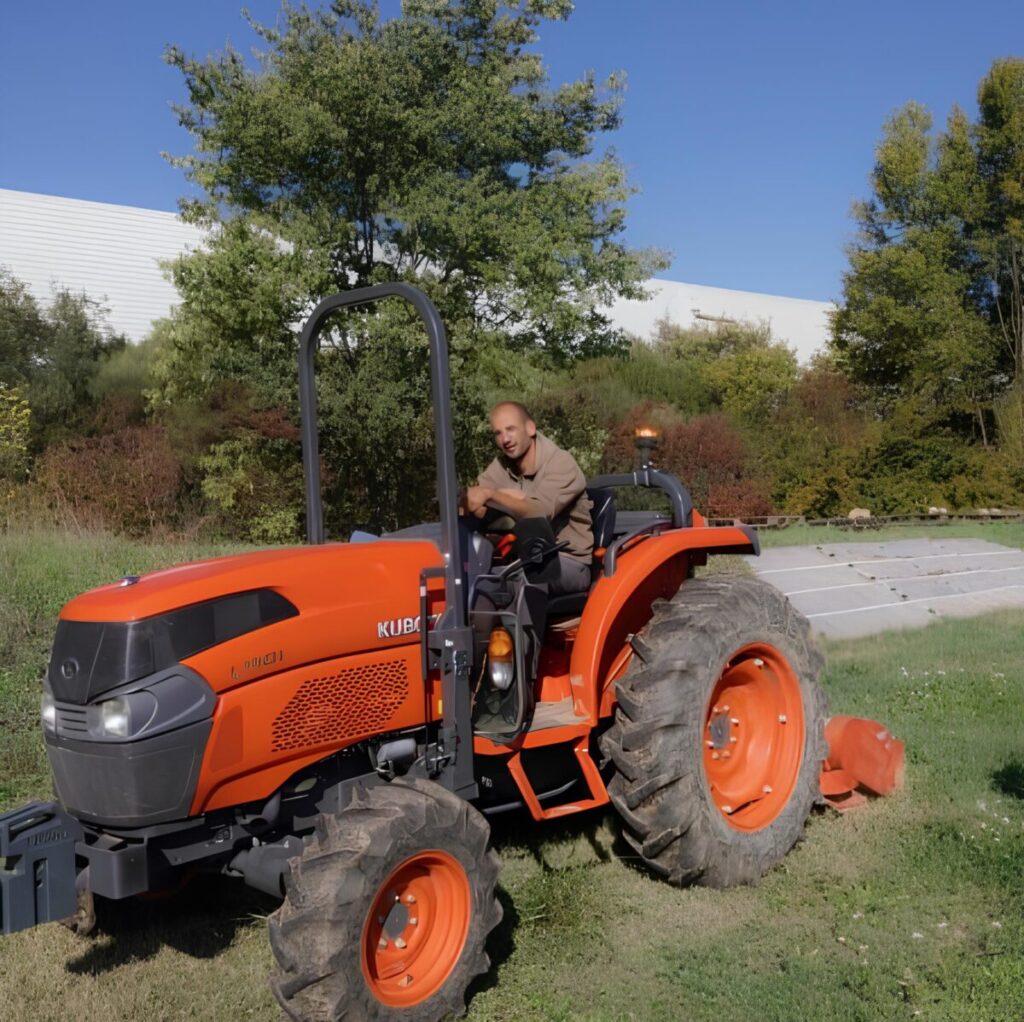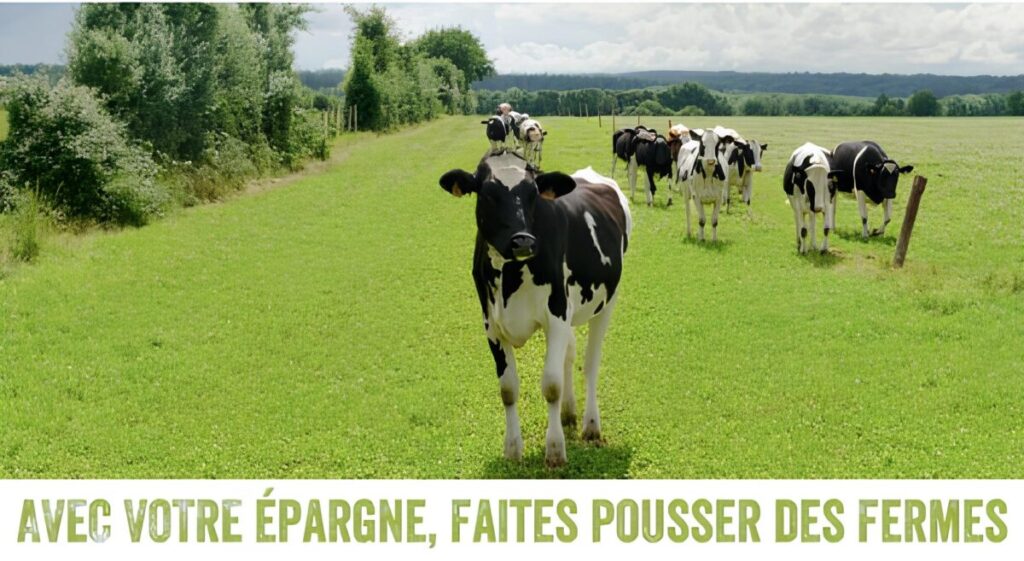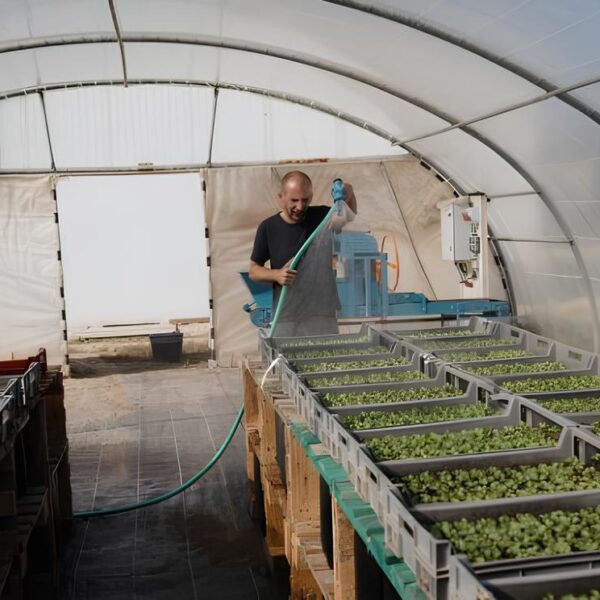In France, an average of 200 farms disappear each week. To combat this phenomenon, Terres de Liens (Lands of Connections), which celebrated its 20th anniversary in 2023, sanctuaries agricultural land thanks to the savings of citizens. The association has already managed to save 378 farms since its creation. This means 800 farmers have been able to settle sustainably. Farmers committed to organic, local, and human-scale agriculture.
With dirty hands and drawn features, Franck Sillam dedicates nearly 70 hours a week to his Ferme des Roselières, four hectares in Provence. “Being a market gardener is not a job, it’s a life,” he confides, while sorting his vegetables for short distribution.
He maintains agricultural land in a peri-urban area, preserves biodiversity, and generates jobs: his work thus makes sense. Moreover, it allows city dwellers to access local and quality food. “With 1.5 hectares, I feed more than 200 families a week,” he proudly explains. “If everyone produced according to our model, we could largely feed the population.”
From Epidemiology to the Land
The Ferme des Roselières is located in a peri-urban area, in Aubagne, a city of nearly 48,000 inhabitants. Part of the land is on the edge of an industrial zone where large brands are seeking to expand. Without Terre de Liens, the agricultural land would never have been preserved. Franck Sillam would never have been able to settle in 2017.
The former epidemiologist had just completed his agricultural conversion. He identifies three plots. The first, a wasteland, belongs to a supermarket chain that did not receive permission to expand. The Metropolis owns the second. The third is owned by a private individual, who offers it at an exorbitant price. “85,000 euros for 4,960 m2, too expensive! Normally, it’s 10,000 euros per hectare in Aubagne, and that’s already expensive!”

Peri-Urban Areas Under Land Pressure
Here indeed, agricultural lands face strong land pressure that drives up prices and makes it difficult for farmers to settle. Franck Sillam could have settled for the first two plots. But he wants to produce nearly 60 different vegetables throughout the year, in rotation. To avoid depleting the soils and to prevent predators from settling in, he needs to double his area. This way, his land can rest between two rotations.
The neo-farmer was aware of the Terre de Liens movement. He was even one of the donors when he was still an epidemiologist in Marseille, operating on the principle that “we are all responsible for the disappearance of agricultural land.”
The meeting really took place during a screening of the film “Faim de Terre,” a local investigation into soil artificialization and, with it, the disappearance of land – equivalent to the city of Marseille every three years. Market gardening lands are gradually being eaten away to build houses. Thus roads, parking lots, commercial areas… At the end of the screening, he explains his purchasing problem regarding the plots. Terre de Liens then decides to buy, through its property company, the 4,960 m2 to lease to Franck, “about 600 euros a year.” With the three plots, he thus forms a farm of two hectares of nutrient-rich land.
The Savings of Citizens
The Ferme des Roselières is one of the 378 farms purchased and supported by Terre de Liens across France. The association acquired them thanks to the capital accumulated by its property company (125 million euros today). This solidarity investment, which includes 13,000 savers, is open to any citizen wishing to place their savings in a project “with high social and ecological value”. The minimum? “The value of a share at 104 euros,” specifies Joël Guitard, co-president of Terre de Liens PACA.
For this volunteer, a retired chemist and “citizen touched by the challenge to be met,” involving citizens in the protection of agricultural land represents a real innovation. “It used to be solely the responsibility of farmers.”
The 378 farms of Terre de Liens adhere to the charter: a human-scale agricultural activity, conducted in organic and local farming. The association aims to “create a link with the land, but also between producer and consumer,” insists the manager. Franck Sillam, for example, distributes his vegetables directly at the farm, at the market in Marseille, and in two AMAP (Associations for the Maintenance of Peasant Agriculture). This humanist also offers products to solidarity grocery stores.
His contract, like all those of Terre de Liens, is a “rural environmental lease.” It allows the farmer to enjoy the land without time limitation, provided he vacates the farm when he ends his agricultural activity or in case of non-compliance with the lease terms. He can terminate it at any time. Without jeopardizing the balance of the property company, as it always finds a successor. “We even have more requests than land,” emphasizes Joël Guitard.
A Rigorous Selection of Candidates
The profile of Terre de Liens farmers is mostly that of Franck Sillam: project holders not coming from the agricultural world, for 60% of candidates for settlement. “They want to work the land, have the skills, but do not possess capital.”
Moreover, half of the applications are not retained. “These people are eager, but are not aware of the difficulties involved in the profession. Their project is of a fantastical nature.” There is then a second selection and an individual interview. These steps are important “because it’s the money of the saver, and the idea is not to send applicants to their doom.” Indeed, the association experiences few failures, “we count them on one hand.”
Supporting Farmers in Difficulty
Sometimes farmers call upon the association even though they are already established. This was the case, for example, of a tenant market gardener whose landlord was selling the land. “We stepped in as buyers, supporting the already established farmer,” details Joël Guitard. The same goes for an orchardist who was facing cash flow problems: “We bought half of his property.”
Finally, the association helps create connections between farmers, often isolated. He gives the example of Franck Sillam who shares “his extensive research” with three neighboring farmers. He has notably developed a bioclimatic greenhouse that stores heat during the day and releases it at night. Without heating or solar panels.
The Ferme des Roselières, besides nourishing the soils and people, allows its farmer to live decently. And without subsidies. His yield is such that Franck Sillam was able to buy, three kilometers away, two hectares from a private individual. He has thus doubled his area. And hired two employees.
This article is part of a trilogy on the theme of rural desertification:
Schoolchildren, an antidote to rural desertification
The NGO Amal Biladi wants to revitalize the villages of the rural world

Cover Photo: Franck Sillam wishes to produce nearly 60 different vegetables throughout the year in rotation ©Terre de Liens
